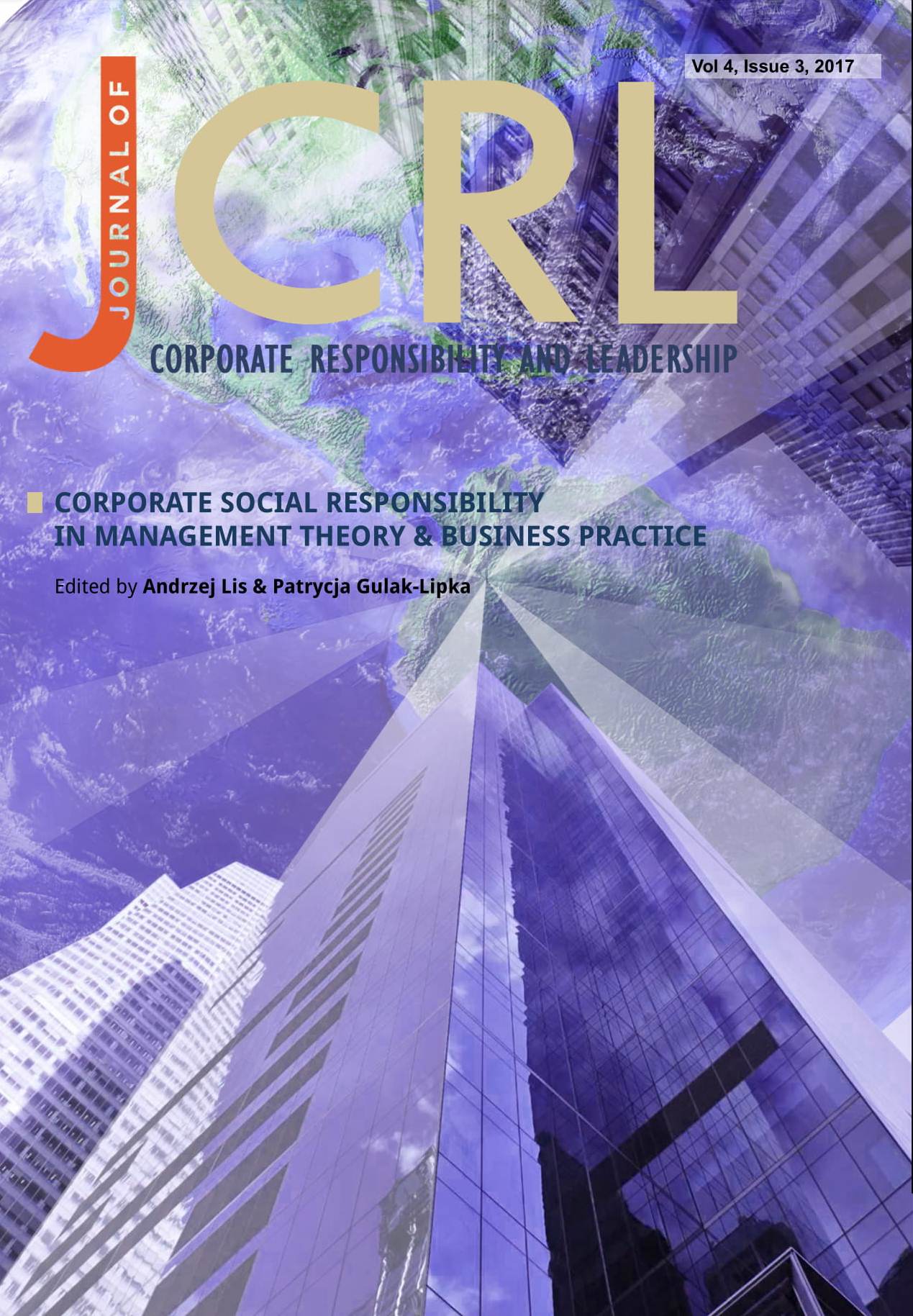Environmental Strategy in Business: Green Marketing Communication
DOI:
https://doi.org/10.12775/JCRL.2017.019Keywords
marketing communication, green consumer, consumer sensitivity, ecological communication, environmental business communicationAbstract
Purpose: The aim of the paper is to explore the issues of green marketing and green marketing communication. Design/methodology/approach: The narrative literature review is a method applied to achieve the aim of the paper.
Findings: The growth of environmental sensitivity is a driving force for change towards new policy tools and environmental eco-nomics. Businesses have developed various tools for environmen-tal communication including environmental balance sheets, social reports, and certifications. It is not enough for businesses to com-municate generic commitment to environmental protection; they have to integrate the concept of ecology into corporate culture by creating strong environmental policies and environmental ethics that describe the enterprise at all organisational levels. Businesses focusing on the development of green products must not only ‘talk ecologically’ but also ‘be ecological’.
Research and practical limitations/implications: The research has an exploratory character since the sample strategy is not probabilistic.
Originality/value: The study can stimulate discussion in the field of green marketing and green marketing communication.
Paper type: literature review.
References
Finch, J.H., Geiger, S., Harkness, R.J. (2017), “Marketing and Compromising for Sustainability: Competing Orders of Worth in the North Atlantic”, Marketing Theory, Vol. 17, Issue 1, pp. 71 – 93.
Garg, A. (2015), “Green Marketing for Sustainable Development: An Industry Perspective”, Sustainable Development, Vol. 23, Issue 5, pp. 301 – 316.
Grant, R.M. (2000), The Greening of Business: The Role of Green Consumerism, the Limits of Earth, and Generation X, doctoral dissertation, Department of Marketing, University of Southern California.
Lanfranchi, M., Giannetto, C., De Pascale, A. (2014a), “Effects of Drought on the Agricultural System: An Analytical Approach Based on the Production Function”, Applied Mathematical Sciences, Vol. 8, No. 104, pp. 5155 – 5162.
Lanfranchi, M., Giannetto C., De Pascale, A. (2014b), “A Consideration of the Factors Influencing Tourism Development in Relation to Biodiversity Conservation”, WSEAS Transactions on Business and Economics, Vol. 11, pp. 508 – 513.
Lanfranchi, M., Giannetto C., De Pascale, A. (2014c), “Economic Implications of Cli-mate Change for Agricultural Productivity”, WSEAS Transactions on Environment and Development, Vol. 10, pp. 233 – 241.
Lanfranchi, M., Giannetto, C., De Pascale, A., Hornoiu, R.I. (2015a), “An Application of Qualitative Risk Analysis as a Tool Adopted by Public Organizations for Evaluating ‘Green Projects’”, Amfiteatru Economic, Vol. 17, Issue 40, pp. 872 – 890.
Lanfranchi, M., Giannetto, C., De Pascale, A. (2015b), “The Link Between Economic Growth and Environmental Quality in the Case of Coastal Tourism in the Rural Areas”, Applied Mathematical Sciences, Vol. 9, No. 35, pp. 1745 – 1755.
Lanfranchi, M., Giannetto, C., Abbate, T., Dimitrova, V. (2015c), “Agriculture and the Social Farm: Expression of the Multifunctional Model of Agriculture as a Solution to the Economic Crisis in Rural Areas”, Bulgarian Journal of Agricultural Science, Vol. 21, No. 4, pp. 711 – 718.
Leakey, R., Van Damme, P. (2014), “The Role of Tree Domestication in Green Market Product Value Chain Development”, Forests Trees and Livelihoods, Vol. 23, No. 1 – 2, pp. 116 – 126.
Matisoff, D.C., Noonan, D.S., Mazzolini, A.M. (2014), “Performance or Marketing Benefits? The Case of LEED Certification”, Environmental Science and Technology, Vol. 48, Issue 3, pp. 2001 – 2007.
Mohd Suki, N. (2017), “Green Products Usage: Structural Relationships on Customer Satisfaction and Loyalty”, International Journal of Sustainable Development and World Ecology, Vol. 24, Issue 1, pp. 88 – 95.
Moser, A.K. (2016), “Consumers’ Purchasing Decisions Regarding Environmentally Friendly Products: An Empirical Analysis of German Consumers”, Journal of Retailing and Consumer Services, Vol. 31, pp. 389 – 397.
Ottman, J.A. (1998), Green Marketing: Opportunity for Innovation, NTC Contempo-rary, Lincolnwood.
Peattie, K. (2001), “Towards Sustainability: The Third Age of Green Marketing”, The Marketing Review, Vol. 2, No. 2, pp. 129 – 146.
Peattie, K., Crane, A. (2005), “Green Marketing: Legend, Myth, Farce or Prophesy?”, Qualitative Market Research: An International Journal, Vol. 8, Issue 4, pp. 357 – 370.
Polonsky, M.J., Mintu-Wimsatt, A.T. (1995), Environmental Marketing Strategies, Practice, Theory, and Research, The Hawthorne Press, New York.
Rahnama, H., Rajabpour, S. (2017), “Identifying Effective Factors on Consumers’ Choice Behavior Toward Green Products: The Case of Tehran, the Capital of Iran”, Environmental Science and Pollution Research, Vol. 24, Issue 1, pp. 911 – 925.
Sadovnikova, A., Pujari, A. (2017), “The Effect of Green Partnerships on Firm Value”, Journal of the Academy of Marketing Science, Vol. 45, Issue 2, pp. 251 – 267.
Voinea, L., Atanase, A., Schileru, I. (2016), “Perceptions of the Slow Food Cultural Trend Among the Youth”, Amfiteatru Economic, Vol. 18, Issue 10, pp. 847 – 861.
Zhu, Q., Sarkis, J. (2016), “Green Marketing and Consumerism as Social Change in China: Analyzing the Literature”, International Journal of Production Economics, Vol. 181, pp. 289 – 302.
Downloads
Published
How to Cite
Issue
Section
Stats
Number of views and downloads: 1098
Number of citations: 0



